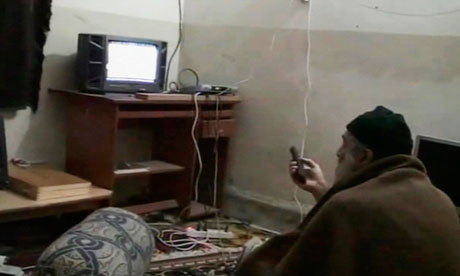
Osama bin Laden is shown watching himself on television in this video frame grab released by the US in 2011. Photograph: Ho/Reuters
Pakistani authorities have charged the three wives of Osama bin Ladenwith illegally entering and living in the country, as an independent investigation into the al-Qaida leader's final days found that his eldest wife was suspected by the other two of betraying him.
The three wives have been in custody since they were left behind last May when a US raiding party found and killed Bin Laden in the northern town of Abbottabad. They had been expected to be freed but it was announced by the interior minister on Thursday that they would be charged with immigration offences.
The news came as an independent investigation by a retired Pakistani brigadier, Shaukat Qadir, claimed that Bin Laden was living in effective retirement in Abbottabad and may even have been senile.
Qadir is known to be close to Pakistan's current army chief, General Ashfaq Kayani, who arranged several visits for him to the Abbottabad compound, which has been cordoned off by security forces since the US operation. The Abbottabad house was suddenly demolished, without explanation, by the Pakistani authorities late last month.
Using transcripts of the interrogation of Bin Laden's wives and interviews with Pakistani intelligence officials, Qadir pieced together the most comprehensive account yet of the al-Qaida leader's life after he fled the Tora Bora mountains of Afghanistan in late 2001. According to Qadir, Bin Laden may have had a kidney transplant back in 2002, which would explain why his known kidney ailment did not require him to undergo dialysis treatment while on the run.
There were 27 people, including bodyguards and members of Bin Laden's extended family living in the house when the al-Qaida leader was killed. They had all got on well until the arrival of Khairiah Sabar in early 2011, Qadir said.
"When Khairiah came, everybody else was very suspicious of her. They didn't trust her at all," Qadir told the Guardian. "I am also of the view that actually the person who sold him [Bin Laden] out was Khairiah, not the fictitious courier who the US keeps talking about being al-Kuwaiti."
"Everything begins to happen with her arrival. Until then, the Americans seem to know nothing."
Qadir's account is at odds with the leaked US official story, which contends that they found the Abbottabad house when they followed an al-Qaida "courier" known as al-Kuwaiti to the home, some time in the second half of 2011.
Khairiah, a Saudi who Bin Laden married in 1985 as the third of his six wives, was freed from Iranian custody in 2010 as part of a murky exchange for an Iranian diplomat who had been kidnapped by extremists in Pakistan.
Aged around 62, she made her way without her children to Abbottabad on Bin Laden's instructions. The other two wives, Siham, a Saudi aged around 54, who had three adult children with her, and Amal, a Yemeni aged around 31, who had five young children, had lived with Bin Laden since he moved into the Abbottabad home in mid-2005. They had also been with him for periods at other hiding places in Pakistan after 2001.
"Bin Laden didn't sleep with any of his other wives after marrying Amal," said Qadir.
At one point, when pressed by Siham's adult son Khalid about why she had come, Khairiah said it was because she had "one final duty" to perform for Bin Laden. It seems that even Bin Laden feared that she would turn him in, and he "kept telling" the other two wives to leave, but they refused, Qadir said.
Despite being apparently cured of kidney failure, Bin Laden was suffering from a degenerative disease, which caused premature senility, Qadir said. As a result, al-Qaida's "shura", or leadership council, sent him into early retirement around 2003 in Pakistan.
Others think that Bin Laden stayed active, as the organisation's spiritual guide and may have been involved in planning details of al-Qaida attacks in the west. But Qadir's theory could explain images that emerged on video tapes found at the Abbottabad house, in which Bin Laden is seen sitting on the floor watching television with childlike fascination.
The Qadir investigation places Bin Laden in South Waziristan, in the tribal area close to the Afghan border, in the early years after 2001. He later travelled back into Afghanistan and then, in 2004, he made his way into northern Pakistan, to the Swat area. Following that, after a few months further south in Haripur district, he eventually moved into the purpose-built Abbottabad home in May 2005.
The Bin Laden wives have never been involved with al-Qaida. Last year, Pakistan's official commission investigating the al-Qaida leader's presence in the country recommended that the wives and children be sent home.
It is not known what has now made Pakistan charge them with the relatively trivial issue of not having a visa, though it was thought that the Saudi authorities, who wield enormous influence in Islamabad, were not keen to take back their citizens.
The wives and children are being held at a house somewhere undisclosed in Islamabad. Rehman Malik, Pakistan's interior minister, said the home would now function as a sub-jail.
"They are being kept in a proper legal manner," said Malik.

No comments:
Post a Comment